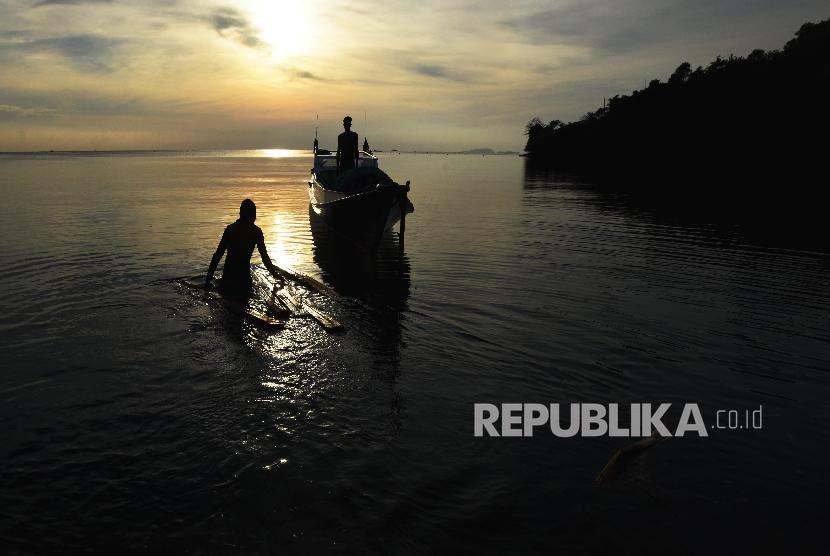REPUBLIKA.CO.ID, JAKARTA -- On a cloudy morning six years ago, Mohammad Ridhwan Mohd Yazid was on his way home to the southern coast of Johor, Malaysia, when his small fishing boat was caught in a sudden storm.
Within minutes, the calm southerly winds of March turned into strong winds that battered his boat, blowing him and his catch that day into the air.
Alone and about a kilometre off Singapore's northwest coast, Ridhwan landed back on the boat near his engine and immediately turned to land.
“I don't care that I lost half of my catches that day. I just want to go home,” the 30-year-old told Al Jazeera in an interview at a beach pier in Pendas, a fishing village in Malaysia's southern state of Johor.
Ridhwan's story is not an isolated one, but one experienced by many traditional Malaysian fishermen who are increasingly affected by the climate crisis, changing weather patterns that govern when and where they can catch fish.
Such fishermen are estimated to amount to about 65 percent of the total fishing community in Malaysia, and are small-scale operators of seaside or riverfront communities that traverse waters near shore or along rivers in search of fish, shellfish, crabs, and other marine animals to meet local demand.
They usually use single-engined boats about seven meters long, spreading the net in an area of up to 9.3 kilometers from shore along more than 4,600 kilometers of coastline in the country.
However, erratic weather, warming seas, and declining fish stocks caused by climate change are slowly driving them away from the sea on which they and previous generations depended.
“In the past, we didn't have to go far to get a good catch. We simply go near the beach,” Mohd Hafiza Abu Talib said as reported by Al Jazeera on Friday (8/3/2024).
Now, he said, the wind could change direction without warning. That ultimately endangers the small fishermen who usually work alone or look for fish at night.
“The wind can suddenly change and take us somewhere else. It's even worse if we're fishing in the dark, and we don't have GPS,” added this man in his late 40s.
Meanwhile, studies conducted by the United Nations (UN) show that the oceans absorb 25 percent of all carbon dioxide emissions and capture 90 percent of the heat generated by these emissions trapped in Earth's atmosphere.
The U.S.-based National Oceanic and Atmospheric Administration (NOAA) showed daily sea surface temperatures of 21 degrees Celsius since early January, one degree higher compared with the same period 30 years ago.
Emissions released by human and industrial activities have pushed the average temperature of the oceans higher, leading to melting ice at the poles, rising sea levels, ocean acidification, ocean heat waves, and increasingly unpredictable weather. Mangroves have also been damaged, and coral reefs, where fish breed, have turned white.
Professor Mohd Fadzil Mohd Akhir, an oceanographer from Universiti Malaysia Terengganu, said that the marine animals, which are sensitive to ocean temperatures, were found to migrate to colder waters when the oceans warmed.
“It's not that when the climate gets warmer, fish aren't available anywhere. Most marine organisms in the tropics will move to colder areas when those areas get warmer,” Mohd Fadzil said.
A 2022 study from the University of British Columbia found that climate change will force 45 percent of fish crossing two or more exclusive economic zones to move out of their natural habitat by the end of the century. An exclusive economic zone (EEZ) refers to an area of ocean or ocean that extends approximately 370 kilometers outside the territorial waters of a country.
The prospect of further declines due to declining yields is a major blow to Malaysia's coastal fishermen who have invested thousands of dollars in the often unprofitable trade. One boat can cost about 14,000 Malaysian ringgit, with the other thousands of ringgit needed for nets, engines, and fuel.
Initially, fishermen in the area blamed dwindling fish supplies on coastal and industrial development. The main complaint is the construction of artificial islands that make up the 2,833-hectare (7,000-acre) Chinese-backed Forest City property project, about 20 kilometres from Pendas.
However, Serina Rahman, a conservation scientist who worked with fishermen in the area for more than 15 years, also saw a dramatic decline when the industry shut down during the COVID-19 pandemic.
“We always thought that it was construction that affected the fish catch,” said the lecturer from the National University of Singapore.
However, Serina and the fishermen realized that fish stocks were not rising back as expected, even as coastal development, previously blamed for declining catches, stalled during the lockdown period.
Encouraged by dwindling fish supplies and extreme weather, some fishermen from Pendas have banded together with help from local environmental groups to build offshore fishing platforms to earn more money.
Referred to as a “kelong” or “raft”, these floating wooden structures serve as a controlled breeding ground for fish and a place for visiting anglers. Potentially, each rig can net up to 100,000 a year in the form of fish; much less risk than going out to sea.
However, Ridhwan finally quit being a fisherman two years ago and sold his boat. Today, Ridhwan does diving work and sometimes takes care of the Pendas' fishing platforms and feeds the fish they cultivate.
“Everyone here wants to be a fisherman. But if it's not good for us, what's the point? We have to change with the times,” Ridhwan said.


